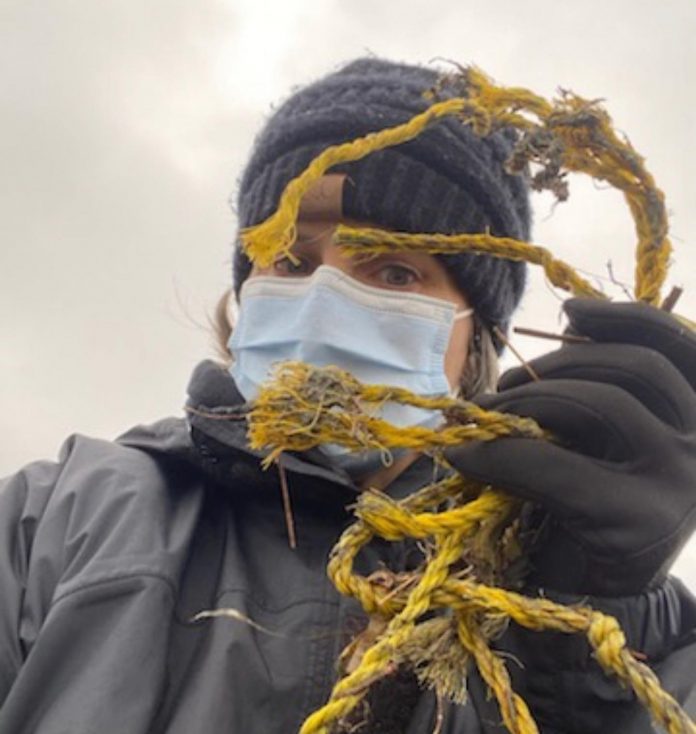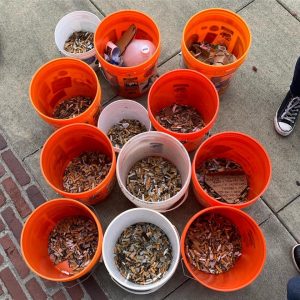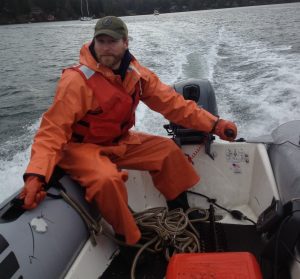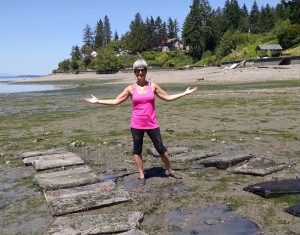
Just because you can’t see something, doesn’t mean it’s not there. Derelict fishing gear, lost crab pots (12,000 annually), and tossed cigarette butts (trillions) are three hazardous ingredients impacting the life in and around Puget Sound. Improving the water quality and caring for the Sound’s inhabitants are everybody’s business. There are many ways to support the on-going help with water and beach cleanup. The future of Puget Sound rests in our continuing maintenance and protection for long-term viability. Surfrider Foundation Olympia Chapter, Washington State Department of Fish and Wildlife and people like Dan Mazur inspire us to be better stewards of our precious resources.
 Olympia Surfrider, a chapter of the national organization, holds a mission to protect and enjoy the world’s ocean, waves and beaches. Jill Williams, vice chair of the Olympia Chapter, is a water enthusiast. She encourages people to grow their awareness of the problem with single use plastics and the impact of cigarette butts on Puget Sound. Did you know cigarette filters are the most common form of plastic litter found on beaches worldwide? They are made of non-biodegradable cellulose acetate. Flicked onto the streets in downtown Olympia, butts make their way into the Puget Sound.
Olympia Surfrider, a chapter of the national organization, holds a mission to protect and enjoy the world’s ocean, waves and beaches. Jill Williams, vice chair of the Olympia Chapter, is a water enthusiast. She encourages people to grow their awareness of the problem with single use plastics and the impact of cigarette butts on Puget Sound. Did you know cigarette filters are the most common form of plastic litter found on beaches worldwide? They are made of non-biodegradable cellulose acetate. Flicked onto the streets in downtown Olympia, butts make their way into the Puget Sound.
Who even throws them on the ground anymore? I wondered. It was stunning to realize that a mere half mile radius around City Hall, easily 2,000 to 8,000 butts are picked up on any given clean-up session. “It could easily be monthly,” Jill adds. That’s why Surfriders hosts “Hold On To Your Butts” volunteer clean-up days. Surfriders would like businesses and people to segregate their smoking debris from the rest of the trash and dispose of it as toxic waste. Keeping all cigarette filters out of Puget Sound and the rest of the ocean would make a world of difference.

You can find more activities to be involved in on the Olympia Surfriders Facebook page.
Cut Fishing Lines Spell Big Trouble for Habitats
Yellow ropes from fishing are another huge concern. Surfriders looks forward to the king tides in the winter. They are so massive they extend far up the beach, leaving behind pieces of yellow rope attached to rocks and brush. “That makes it easier to clean,” says Jill, adding, “Otherwise, they go back, into the ocean.” Ropes from our area make their way down to Oregon and up to Canada. “The industry is working hand-in-hand with groups like Surfriders to find better solutions,” says Jill.
When Lacey resident Dr. Dayv Lowry, PhD worked for Washington State Fish and Wildlife, he was part of a team removing fishing nets lost or abandon in the Sound. The project focused on collecting long monofilament fishing lines and nets that sink to the bottom. “They don’t biodegrade,” he explains. “They wrap over rocks and block habitat.” Some could be removed by divers, and some were removed by remotely operated vehicles tethered to the surface. State divers are authorized to 105 feet. Many nets go deeper. The U.S. Navy needed deep water training exercises and stepped in to retrieve the lost nets. Cooperatively, the State of Washington and U.S. Navy removed 5,000 nets.

“There’s tons and tons of garbage and we can get rid of it,” affirms Dayv. It takes time and resources. We don’t see all those nets, but they are there, creating problems for sea life. “Thousands and thousands of crab and shrimp pots are lost,” he adds. That’s another focus of clean up.
Now Dayv is the rockfish recovery coordinator for NOAA Fisheries/US Dept of Commerce. While his family stays home, he spends part of each year out on the ocean studying and collecting information about fish. Most recently, he was on the Ruben Lasker, a NOAA survey vessel. Scientists zig-zagged off the west coast to evaluate the sardine and anchovy population, elemental to the food web. By collecting data about their size and sex ratio, they can determine how the population is doing and how much is acceptable to catch for human consumption. By tracking the fish, decisions can be made to prevent over-fishing and ensure the renewability of the industry.
Responsible Harvesting
Mountain climber and environmental steward, Dan Mazur, spearheads oyster planting along Olympia’s beaches. This year volunteers planted both Pacific and Olympia oysters. An adult oyster is said to filter 50 gallons of water every day, all the better for making Puget Sound safer and cleaner.

What to help keep trash out of our oceans? Here are some tips:
- When you are out fishing, clip your pieces of fishing line and keep them to throw away later. Don’t pitch them overboard.
- If you find lost or abandon fishing equipment, throw it away or report it.
- Check out volunteer days and pick up butts or plant a few oysters.
- Wherever you are, take all your waste and garbage with you and dispose of properly.
- Don’t pee over the side of your boat.
We are so fortunate to live in the beauty and abundance around Puget Sound. Let’s all be thoughtful stewards so we can all enjoy for years to come.
















































